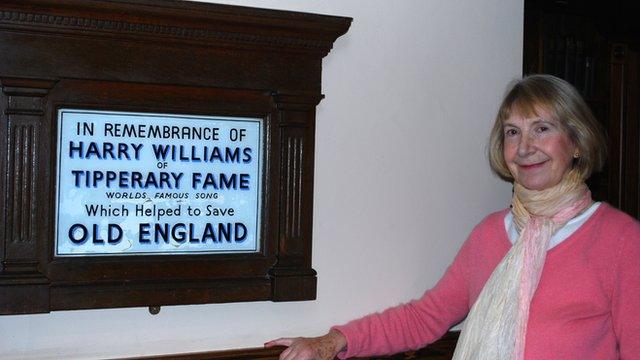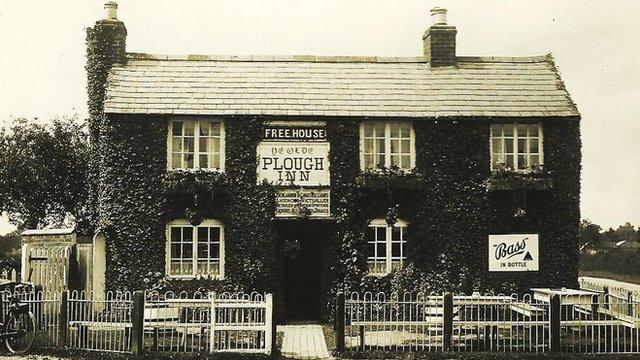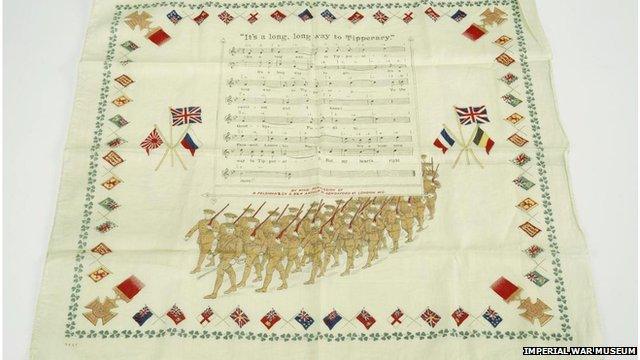World War One: Bet on It's a Long Long Way to Tipperary
- Published

Meg Pybus, great niece of Mr Williams, inside the pub where he lived
Many of the songs sung by soldiers fighting in World War One are still famous today. The history of It's A Long Long Way To Tipperary includes a bet, a change of title, and a dispute about where it was written.
The rival claims to be place where the song It's A Long Long Way To Tipperary was written are lodged by Balsall Common in the West Midlands and Stalybridge in Greater Manchester.
Balsall Common boasts the Tipperary pub, where Harry Williams, one of the song's composers, lived.
Jack Judge, the song's co-composer and the man who performed it in music halls before WW1, is remembered with a life-sized statue in Stalybridge, external and with a plaque on the wall of the pub where he said he wrote the song.
The two men originally met in Oldbury - when Mr Judge was making a living selling fish outside a pub.
At the time Mr Williams, who was in a wheelchair after an accident, lived with his parents in The Plough Inn, now renamed The Tipperary, in Temple Balsall.
Soon after the meeting, the pair began to write songs together, according to Meg Pybus, great niece of Mr Williams.
'Long way to Connemara'
"They wrote about 32 songs for the music hall, including Tipperary," she said.
"That was written in 1909 and it was called It's A Long Way to Connemara.
"At the time there were a lot of ballads because Irish people were leaving Ireland and coming to London and it was a very upsetting thing to leave."
She said Mr Judge came from Ireland and "Harry was able to put down exactly what he felt".

Harry Williams parent's ran The Plough Inn, and Jack Judge sold fish outside
The origin of the song is seen very differently in Stalybridge, with Jack Judge writing the song overnight in 1912 to win a bet.
According to local historian Mike Pavasovic it was written at the now-demolished New Market Tavern and was given its first public performance the following night at the Grand Theatre.
"We're told that Jack Judge was bet five shillings (25p) that he couldn't write a song in 24 hours and as he was making his way to his digs that night a man, possibly drunk, was trying to find his way home and said he had a long long way to go.
"Judge tied that up with the fact that his own parents were from Ireland and the rest is history."
Royalties still paid
There is no argument that he was appearing in the Grand Theatre in January 1912, but Ms Pybus believes he 'pulled a fast one' to win the bet.
"He had the Connemara song with him and I won't say he lied, but he pretended he'd written it [overnight].
"When he got back to the pub I think Harry was extremely angry, but on the other hand it worked."
Imperial War Museum's Matt Brosnan: It's a song about being away from home and wanting to return to your sweetheart
Both men are certainly credited with the song on sheet music from the time, and four of Mr Williams' relatives still receive royalties, according to Ms Pybus.
As war with Germany became more likely she said their publisher suggested turning their music hall number into a marching song by adding a second 'long' to the title.
And so It's A Long Way to Connemara became It's A Long Long Way To Tipperary.
Wherever the song was written it owes its huge popularity to a newspaper article, according to Matt Brosnan, a historian at the Imperial War Museum
"A Daily Mail journalist called George Curnock saw some soldiers of the Connaught Rangers singing the song as they disembarked in France in August 1914.
"He reported this in the dispatch he sent back to his newspaper and that popularised the song to a big readership.
"And in November it was recorded by a popular Irish singer called John McCormack and was a big hit single."
The song was even picked up and sung by the French, Russian and German armies according to Mr Brosnan, though it remained a special marching song for British troops.
"It stayed almost as an anthem of the British Army through both world wars," he added.
A decorative It's A Long Long Way To Tipperary handkerchief features in an exhibition at the Imperial War Museum North marking the contribution the North West made during the World War One.
Find out more about the origins of the song It's a Long Long Way to Tipperary and what made Pack Up Your Troubles the viral hit of WW1 with Gareth Malone.

Handkerchief with the music to It's A Long Long Way To Tipperary
- Published12 November 2011